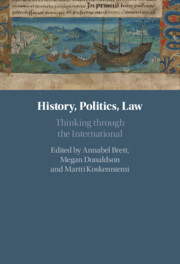129 results
2 - Performing Legal Expertise: Reflections on the Construction of Transnational Authority
- from Part I - Theorising Legal Expertise
-
-
- Book:
- Law, Legal Expertise and EU Policy-Making
- Published online:
- 13 October 2022
- Print publication:
- 20 October 2022, pp 19-42
-
- Chapter
- Export citation
Establishing Norms in a Kaleidoscopic World. By Edith Brown Weiss. Leiden Pocketbooks of The Hague Academy of International Law Vol. 39, Brill, 2020. Pp. 544.
-
- Journal:
- American Journal of International Law / Volume 116 / Issue 1 / January 2022
- Published online by Cambridge University Press:
- 14 January 2022, pp. 211-214
- Print publication:
- January 2022
-
- Article
- Export citation
Part II - Thinking through the International
-
- Book:
- History, Politics, Law
- Published online:
- 28 September 2021
- Print publication:
- 07 October 2021, pp 127-380
-
- Chapter
- Export citation
Law and Constructions of the Political
- from Part II - Thinking through the International
-
- Book:
- History, Politics, Law
- Published online:
- 28 September 2021
- Print publication:
- 07 October 2021, pp 129-188
-
- Chapter
- Export citation
Institutions and Persons
- from Part II - Thinking through the International
-
- Book:
- History, Politics, Law
- Published online:
- 28 September 2021
- Print publication:
- 07 October 2021, pp 229-282
-
- Chapter
- Export citation
2 - The Past according to International Law
- from Part I - Methods, Approaches and Encounters
-
-
- Book:
- History, Politics, Law
- Published online:
- 28 September 2021
- Print publication:
- 07 October 2021, pp 49-68
-
- Chapter
- Export citation
Notes on Contributors
-
- Book:
- History, Politics, Law
- Published online:
- 28 September 2021
- Print publication:
- 07 October 2021, pp ix-xii
-
- Chapter
- Export citation
Gender
- from Part II - Thinking through the International
-
- Book:
- History, Politics, Law
- Published online:
- 28 September 2021
- Print publication:
- 07 October 2021, pp 339-340
-
- Chapter
- Export citation
Part I - Methods, Approaches and Encounters
-
- Book:
- History, Politics, Law
- Published online:
- 28 September 2021
- Print publication:
- 07 October 2021, pp 17-126
-
- Chapter
- Export citation
Empires, States and Nations
- from Part II - Thinking through the International
-
- Book:
- History, Politics, Law
- Published online:
- 28 September 2021
- Print publication:
- 07 October 2021, pp 189-228
-
- Chapter
- Export citation
Index
-
- Book:
- History, Politics, Law
- Published online:
- 28 September 2021
- Print publication:
- 07 October 2021, pp 381-410
-
- Chapter
- Export citation
Introduction - History, Politics, Law
-
-
- Book:
- History, Politics, Law
- Published online:
- 28 September 2021
- Print publication:
- 07 October 2021, pp 1-16
-
- Chapter
- Export citation
Copyright page
-
- Book:
- History, Politics, Law
- Published online:
- 28 September 2021
- Print publication:
- 07 October 2021, pp iv-iv
-
- Chapter
- Export citation
Acknowledgments
-
- Book:
- History, Politics, Law
- Published online:
- 28 September 2021
- Print publication:
- 07 October 2021, pp vii-viii
-
- Chapter
- Export citation
Contents
-
- Book:
- History, Politics, Law
- Published online:
- 28 September 2021
- Print publication:
- 07 October 2021, pp v-vi
-
- Chapter
- Export citation
Economics and Innovation
- from Part II - Thinking through the International
-
- Book:
- History, Politics, Law
- Published online:
- 28 September 2021
- Print publication:
- 07 October 2021, pp 283-338
-
- Chapter
- Export citation

History, Politics, Law
- Thinking through the International
-
- Published online:
- 28 September 2021
- Print publication:
- 07 October 2021
Conclusion and Epilogue
- from Part IV - Germany: Law, Government, Freedom
-
- Book:
- To the Uttermost Parts of the Earth
- Published online:
- 05 August 2021
- Print publication:
- 26 August 2021, pp 952-967
-
- Chapter
- Export citation
8 - The Law and Economics of State-Building
- from Part III - Britain: Laws and Markets
-
- Book:
- To the Uttermost Parts of the Earth
- Published online:
- 05 August 2021
- Print publication:
- 26 August 2021, pp 561-621
-
- Chapter
- Export citation
Part I - Towards the Rule of Law
-
- Book:
- To the Uttermost Parts of the Earth
- Published online:
- 05 August 2021
- Print publication:
- 26 August 2021, pp 17-346
-
- Chapter
- Export citation



